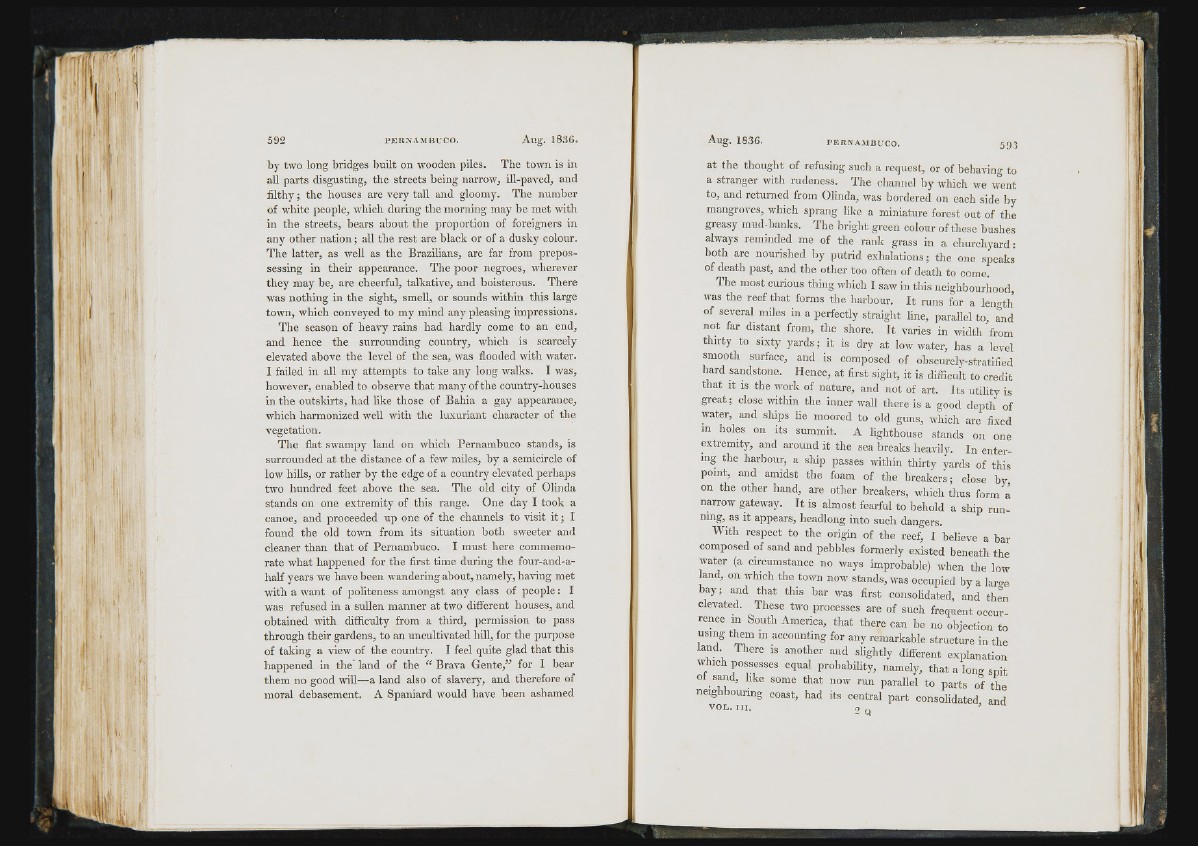
by two long bridges built on wooden piles. The town is in
all parts disgusting, the streets being narrow, ill-paved, and
filthy ; the houses are very tall and gloomy. The number
of white people, which during the morning may he met with
in the streets, bears about the proportion of foreigners in
any other nation ; all the rest are black or of a dusky colour.
The latter, as well as the Brazilians, are far from prepossessing
in their appearance. The poor negroes, wherever
they may be, are cheerful, talkative, and boisterous. There
was nothing in the sight, smell, or sounds within this large
town, which conveyed to my mind any pleasing impressions.
The season of heavy rains had hardly come to an end,
and hence the surrounding country, which is scarcely
elevated above the level of the sea, was flooded with water.
I failed in all my attempts to take any long walks. I was,
however, enabled to observe that many of the country-houses
in the outskirts, had like those of Bahia a gay appearance,
which harmonized well with the luxuriant character of the
vegetation.
The fiat swampy land on which Pernambuco stands, is
surrounded at the distance of a few miles, by a semicircle of
low hills, or rather by the edge of a country elevated perhaps
two hundred feet above the sea. The old city of Olinda
stands on one extremity of this range. One day I took a
canoe, and proceeded up one of the channels to visit it ; I
found the old town from its situation both sweeter and
cleaner than that of Pernambuco. I must here commemorate
what happened for the first time during the four-and-a-
half years we have been wandering about, namely, having met
with a want of politeness amongst any class of people : I
was refused in a sullen manner at two different houses, and
obtained with difficulty from a third, permission to pass
through their gardens, to an uncultivated hill, for the purpose
of taking a view of the country. I feel quite glad that this
happened in the land of the “ Brava Gente,” for I bear
them no good will—a land also of slavery, and therefore of
moral debasement. A Spaniard would have been ashamed
________________________________ ^
Aug. 1 8 3 6 . P E R N A M B U C O . 59,;
at the thought of refusing such a request, or of behaving to
a stranger with rudeness. The channel by which we went
to, and returned from Olinda, was bordered on each side by
mangroves, which sprang like a miniature forest out of the
greasy mud-banks. The bright green colour of these bushes
always reminded me of the rank grass in a churchyard:
both are nourislied by putrid exhalations; the one speaks
of death past, and the other too often of death to come.
The most curious thing which I saw in this neighbourhood
was the reef that forms the harbour. It runs for a leno-th
of several miles in a perfectly straight line, parallel to, and
not far distant from, the shore. It varies in width from
thirty to sixty yards; it is dry at low water, has a level
smooth surface, and is composed of obscurely-stratified
hard sandstone. Plence, at first sight, it is difficult to credit
that It IS the work of nature, and not of art. Its utility is
great; close withm the inner wall there is a good depth of
water, and ships lie moored to old guns, which are fixed
m holes on its summit. A lighthouse stands on one
extremity, and around it the sea breaks heavily. In entering
the harbour, a ship passes within thirty yards of this
point, and amidst the foam of the breakers; close by
on the other hand, are other breakers, which thus form a
narrow gateway. It is almost fearful to behold a ship running,
as It appears, headlong into such dangers.
With respect to the origin of the reef, I believe a bar
composed of sand and pebbles formerly existed beneath the
water (a circumstance no ways improbable) when the low
land, on which the town now stands, was occupied by a laro-e
bay; and that this bar was first consolidated, and thin
elevated. These two processes are of such frequent occurrence
in South America, that there can be no objection to
using them m accounting for any remarkable structure in the
land Ihere is another and slightly different explanation
which possesses equal probability, namely, that a long spit
of sand, like some that now run parallel to parts of the
neighbouring coast, had its central part consolidated, and
V O L . I I I . o Q
I I